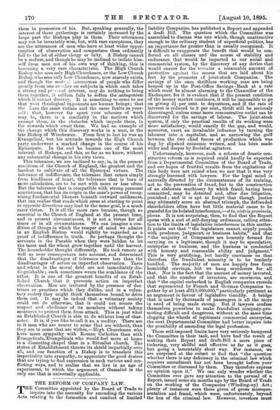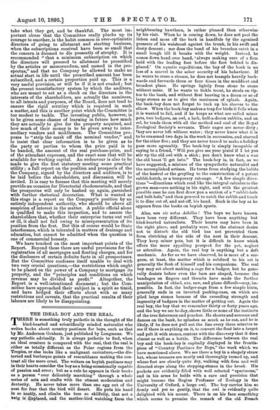THE REFORM OF COMPANY LAW.
rPHE Committee appointed by the Board of Trade to inquire into the necessity for amending the various Acts relating to the formation and conduct of limited liability Companies, has published a Report and appended a draft Bill. The question which the Committee was assembled to discuss was one which, though unattractive enough to the ordinary student of superficial politics, has an importance far greater than is usually recognised. It is difficult to exaggerate the benefit that would be con- ferred on all classes and the access of stability and endurance that would be imparted to our social and commercial system, by the discovery of any device that would ensure for the investor a reasonable amount of protection against the snares that are laid about his feet by the promoter of joint-stock Companies. The savings of the once thriftless working man are being heaped up in the Post-Office Savings -Bank at a rate which must be almost alarming to the Chancellor of the Exchequer, for it is evident that if the present condition of the money market continues, it will be impossible to go on giving 4 per cent, to depositors, and if the rate of interest is reduced to 2 per cent., thrift will be seriously discouraged, unless some more remunerative outlet can be discovered for the savings of labour. The joint-stock system, if only the practical results of its working were more satisfactory, would exactly fit the gap, and would, moreover, exert an invaluable influence by turning the labourer into a capitalist, and so narrowing the gulf between the two chief forces of production which was dug by slipshod economic writers, and has been made wider and deeper by Socialist agitators.
Unfortunately, however, such a scheme of drastic con- structive reform as is required could hardly be expected from a Departmental Committee of the Board of Trade, and our hopes of fruitful results from the cogitations of this body were not raised when we saw that it was very strongly leavened with lawyers. For the legal mind is naturally directed by the circumstances of its training, not to the prevention of fraud, but to the construction of an elaborate machinery by which fraud, having been committed, may be detected and, after due litigation, punished ; and it is apt to forget that though justice may ultimately score an abstract triumph, the defrauded shareholders often have but little material cause to be grateful for its belated interference, —et ku,victrix provineia, plorcr,s. It is not surprising, then, to find that the Report opens with a sort of self-denying ordinance, calling atten- tion to the limits of legislative interference in this matter. It points out that "the legislature cannot supply people with prudence, judgment, or business habits," and that "the majority of Companies are honestly formed for carrying on a legitimate, though it may be speculative, enterprise or business, and the business is conducted with honesty and reasonable ability and judgment." This is very gratifying, but hardly convinces us that therefore the fraudulent minority is to be tenderly handled. The majority of men are happily free from homicidal cravings, but we hang murderers for all that. Nor is the fact that the amount of money invested, and that the number of investors, are enormous, and that "the capital embarked in English companies exceeds that represented by French and German Companies to- gether by at least £315,000,000," particularly pertinent as an argument in favour of legislative timidity. A bridge that is used by thousands of passengers is all the more in need of being made strong. But if lawyers confess themselves powerless to make fraudulent company-pro- moting difficult and dangerous, without at the same time clogging the wheels of legitimate commercial enterprise, the next Departmental Committee had better inquire into the possibility of amending the legal profession.
These self-imposed limits have very seriously hampered the Committee in their task, and have had the result of making their Report and draft-Bill a mere piece of tinkering, very skilful and effective as far as it goes, but going a lamentably short way. For instance, we- are surprised at the outset to find that "the question whether there is any deficiency in the criminal law which requires amendment has not been brought before your Committee or discussed by them. They therefore express no opinion upon it." We can only wonder whether the Committee ever gave any attention to the perusal of a Report, issued some six months ago by the Board of Trade on the working of the Companies (Winding-up) Act ; plenty of instances were there given of gross misrepre- sentation and fraud, which were, unfortunately, beyond the ken of the criminal law. However, investors must take what they get, and be thankful. The most im- portant abuse that the Committee really plucks up its courage to smother, is the habit common in over-optimistic directors of going to allotment and starting business, when the subscriptions received have been so small that the concern is doomed to die presently of atrophy. It is recommended "that a minimum subscription on which the directors will proceed to allotment be prescribed i by the articles or memorandum, and named n the pro- spectus," and that no Company be allowed to make an actual start in life until the prescribed amount has been subscribed, and a certain proportion paid up. This is a very useful provision, or will be if it is not evaded ; but the present unsatisfactory system by which the auditors, who are meant to act as a check on the directors in the interests of the shareholders, are actually the nominees, to all intents and purposes, of the Board, does not tend to ensure the rigid scrutiny which is required in such a matter, and this is another point which the Committee is too modest to tackle. The investing public, however, is to be given some chance of learning in future how much they are actually to give for the property acquired, and how much of their money is to be given away to inter- mediary vendors and middlemen. The Committee pro- poses to "strip the mask off the nominal vendor," and to insist that clear information is to be given as to the party or parties to whom the price paid is to be handed, the amount of the real purchase-price, and of the attendant expenses, and the exact sum that will be available for working capital. An endeavour is also to be made to give the first statutory meeting some practical utility ; a full report on the position and prospects of the the Company, signed by the directors and auditors, is to be laid before the shareholders, and discussion will be invited. It is easy to foresee that this meeting will merely provide an occasion for Directorial rhodomontade, and that the prospectus will only be hashed up again, garnished with further rhetorical decoration. What is wanted at this stage is a report on the Company's position by an entirely independent authority, who should be above all suspicion of interest in the matter. A public official alone is qualified to make this inspection, and to assure the shareholders that, whether their enterprise turns out well or ill, it shall not fail owing to misrepresentation of its position from the first. But this of course would be State interference, which is tolerated in matters of drainage and education, but cannot be admitted when the question is one of commercial honesty.
We have touched on the most important points of the Report. Beyond these there are useful provisions for the registration of all mortgages and floating charges, and for the disclosure of certain definite facts in all prospectuses. But the Committee confesses itself unable to deal with two very crucial questions,—the restrictions which ought to be placed on the power of a Company to mortgage its property, and the "principles and conditions on which revenue may be divided as profit." Altogether, the Report is a well-intentioned document ; but the Com- mittee have approached their subject in a spirit so timid, and have hedged their efforts about with so many restrictions and caveats, that the practical results of their labours are likely to be disappointing.



































 Previous page
Previous page